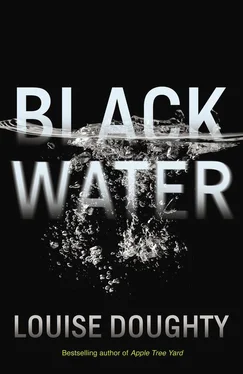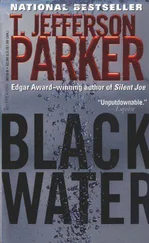As soon as he started to walk around the hut, heavy-footed and exhausted as he was each morning, he heard the sound of Kadek on the veranda. He was never sure what time Kadek arrived but it was usually as dawn broke, in order to be there when Harper awoke.
He went to the doors and slid back the wooden block, a task that seemed so easy and natural in daylight he didn’t even think about it. He pulled the doors wide open and stepped onto the veranda. Outside, it was grey and hot. The valley was flung before him: the hillside opposite his hut rose almost vertically, a vast steep wall of misted palm trees and in the distance, Gunung Agung, holy mountain, the volcano, its lower slopes wreathed in cloud so that it looked, as it often did, as if it was floating above the forest. His hut was kaja , it looked towards the mountain, which pleased him. Perhaps he was getting religious in his old age.
Kadek stood at the far end of the veranda as he did each morning, keeping a respectful distance until bidden. He was holding a bucket of water.
‘Good morning, Mr Harper,’ he said, with the slightest of bows. And then, the expressionless statement: ‘I hope you passed a peaceful night.’
Kadek’s vocabulary was not wide but he spoke English with precision. His plain oval face was open and concerned and Harper had the feeling that the man knew nights were bad for him. He wondered what Kadek really thought of him. The hut belonged to the Institute and must have been used by other operatives but there was no trace of them, not so much as a few battered paperbacks in the wooden cupboard in the corner. As a result, Harper felt possessive about the hut, and about Kadek, although he was not naïve enough to imagine his feelings were reciprocated.
He wanted to say to Kadek, take a good look: do I look like a bule to you? He had spoken Indonesian to Kadek when he first arrived but they had soon slipped into English. It was often the same on these islands. In Europe and America, those demanding lands, he was a man required to explain himself, his thick black hair, his large black eyes. On the plane coming here, he could feel his skin colour changing mid flight: he got whiter and whiter the further east he flew.
He would have liked to discuss this with Kadek but he didn’t want to embarrass the man, who probably thought that Harper looked pretty damn white to him and either way worked for a large and powerful organisation with some hard dollars to spend. Wasn’t trying to befriend Kadek as insulting, in its own way, as giving him orders? So he did indeed behave like all the other white men who came to this island and all the islands on this vast archipelago. Perhaps that was why he woke in the night. It wasn’t fear: it was hatred, hatred of himself. It was the knowledge that if — when — the men with machetes came, he, like all the other bule , would probably deserve it.
He nodded to Kadek. Kadek stepped forward with the bucket and poured water into the bowl on the small table to the right of the door, placed the bucket by the table, then lifted the towel that was hanging over his arm and folded it neatly next to the bowl, knowing that Harper liked his morning wash here, looking out over the valley. Later, he would pour more water in the bak mandi to the side of the hut.
‘ Terima kasih .’
‘Shall I bring your breakfast, Mr Harper?’ Kadek replied.
He stepped up to the bowl and splashed his face with water, then stood upright again with his face dripping. ‘Thank you Kadek, if you could leave it on the desk. I’m going for a walk down to the river.’
Kadek gave another small bow, retreated. Harper pulled his T-shirt over his head, dropped it in a small crumple on the table, to the left of the bowl, and bent to finish his wash. He submerged each of his arms in turn, splashing water under his armpits, feeling, as he always did, the looseness of the muscles on the upper arms, muscles that had once been as taut as wire, or so he liked to think. He could pull his own weight up and down on a bar dozens of times in a row when he was a young man: not any more. He picked up the half coconut shell next to the bowl, filled it with a little water, rinsed it in case there were ants invisible against the dark grain of the wood and tossed the water over the balcony, filled it again and, bending his head, tipped it over his hair and the back of his neck, inhaling at the shock of it.
He dried himself with his T-shirt, then plunged it into the water, immersing it, pressing down on the blisters of air that rose in the fabric. A picture came to him, black water, long strands of hair, clinging like seaweed across his wrist: he dismissed the picture. Instead, he played the game of pressing at the bubbles of air beneath the T-shirt until they formed smaller bubbles, mobile beneath the thin material. Then he was impatient with the game and held the whole T-shirt down, crushing it between his fists. It was like drowning a kitten.
The path down to the river was narrow and steep. Black and yellow butterflies sprang amongst the foliage. It took ten minutes to descend but twice that to go back up, three times if you attempted it in the full heat of midday. After his disturbed night, it was calming to be walking in the grey, hot morning. His old boots — how many years had he had them? Expensive tan leather when new, from a shop on Oud Zuid, they were now so beaten and pale they were as comfy as slippers. The noise of the river rose to greet him, pure and deafening.
His favourite spot was a few minutes’ walk from the bottom of the path, with a large rock that protruded over a pool. It was inviting enough to bathe in but he knew the ticks and parasites that lived there could be as deadly as the gangs of men who, he was convinced, would soon be roaming the countryside at night, just as before. On balance, he would prefer to face the men: and again, it came to him, just as it had in the pitch dark, his certainty, his own calmness in the face of it.
He sat down on the rock, withdrew his notebook and pencil from his pocket and in his neat but tiny scrawl, began to write. He had never needed to use code for his notes, that was how tiny and dense his writing was, but in any case, he would tear this page out later. It was only a first draft, the first draft of a letter that he would transfer onto fragile blue airmail paper when he returned to his hut.
He wrote a few lines, then stopped. Francisca, how will she understand? But he had to write or at least try. His wife — well, ex-wife now — it would be yet another tragedy for her. She wore tragedy well, it suited her, but he felt bad all the same because he knew in some way, she would blame herself. That was what Francisca did. Then there was his mother, Moeder . Ma. Anika. At this thought, he groaned aloud. She was alone now, with her bitter memories, and him the only child living. She was still drinking herself to death in the old house but the harder she drank, the longer she seemed to live. When they told her he was missing, it might not even register, so far gone was she. He watched the cool water of the pool beneath where he sat on the rock and the insects zig-zagging above its surface and thought that, when they came, the men with machetes, they would be very young; no more than boys really, skinny boys with long fingers and wide eyes, red bandanas tied round their foreheads, faces smeared with paint. The black shirts would come later, when the militias had had time to get organised. Did anyone really believe Habibie could prevent that, with the Generals pulling the strings? The boys were more haphazard in what they did but just as deadly. Young men believed in violence, after all: it was their religion, all over the world, whatever god they nominally worshipped — and this time, three decades on from the last, it would surely be no different. He could picture the procession that would come up the side of the valley in the night. They would pass this very spot. He was fairly sure they would come in this direction because the river path led directly to the edge of town.
Читать дальше












